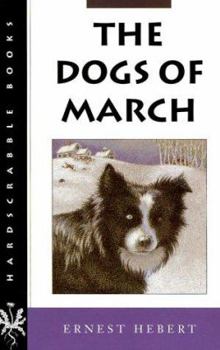Book Overview
Life, love, death, and laughs in a small American townHis life had come to this: save a few deer from the jaws of dogs. He was a small man sent to perform a small task. Howard Elman is a man whose... This description may be from another edition of this product.
Format:Paperback
Language:English
ISBN:0874517192
ISBN13:9780874517194
Release Date:February 1995
Publisher:University Press of New England
Length:272 Pages
Weight:0.75 lbs.
Dimensions:0.7" x 5.5" x 8.5"
Customer Reviews
4 ratings
The Dogs of March is an American Classic
Published by Thriftbooks.com User , 17 years ago
Reviewers have noted that in Darby, Ernest Hebert has created New Hampshire's own version of Faulkner's Yoknapatawpha County. Howard Elman, the main character in The Dogs of March, and a recurring character in the series is a working man, ignorant in many ways through his near illiteracy. He becomes unemployed, and without health insurance early in the story when the factory he's worked in all his life is sold and the jobs and machinery are moved south. He finds himself in a battle against change and in conflict with the new people moving into the area who have "college degrees and big bank accounts." Zoe Cutter is the newcomer who's bought the property adjacent to Howard Elman's forty acres. Zoe has come from the city with plenty of money and ideas about turning the property into an idyllic New England landscape, and running a country boutique. The junk cars and abandoned machinery that are eyesores to Zoe are as much a part of the landscape to Howard as the trees and the stone walls. Hebert was probably the first (and may remain the only) author to masterfully, elegantly and genuinely create Granite State natives, working class people, as complete characters not just as caricatures of the stereotypical New England Yankee, used to backdrop bigger stories. When I think about why The Dogs of March has endured for nearly 30 years, why it remains in print and why I find it as true and relevant now as I did when I first read it, I believe it's because beneath the well drawn characters, the intimate sense of place, and the taut, compelling plot, flowing throughout the story and elevating it to literature is a theme about insiders and outsiders. What has often been called regional fiction isn't regional at all. This is a universal story. A lot of the authors I love are household names. Ernest Hebert is not as widely known, but he is one of my favorites and may turn out to be one of the best writers you've never heard of -- yet.
Extraordinary
Published by Thriftbooks.com User , 19 years ago
I was born and raised in New Hampshire and, to echo a previous reviewer from the Granite State, this is spot on. I love Russo's books, but "Dogs of March" is far more gritty and, at a dirt level, far more realistic. The town I grew up in had trash men that were constantly building "additions" to their tin, aluminum foil and tar paper shack out by the railroad tracks. They were clones of the Ollie Jordan family in Hebert's novel. Besides the characters, there is a powerful story of what drives men to do extraordinary and bizarre things. This is among a handful of novels I've read twice.
Better than "Beans"
Published by Thriftbooks.com User , 23 years ago
I read Hebert's novel many years ago and was surprised when it went out of print. It is a wonderful novel, much better and more profound I think than "The Beans of Egypt, Maine" in honestly protraying rural poverty in New England. Hebert's characters are beautifully rendered and unlike with Chute's, the author does not condescend to them nor does he make them larger or smaller than life, though he does portray them with empathy and with heart. His characters have their own pettiness and desires and dignity, and he allows them to follow their own paths without making them cartoon-like puppets or grotesques. They are poor but they are not made to argue for some political point of view (though of course one can hardly not be moved when the main character talks about "teeth"--when referring to the lack of dental care for the poor). As with all great art, this novel makes its politcal statement by fashioning characters we do identify with. This is a profoundly moving novel that deserves to be rediscovered and applauded as the gritty and realistic novel it is.
Hebert Knows Yankee Hicks
Published by Thriftbooks.com User , 25 years ago
I was sorry I waited to read it. I am from New Hampshire, a strange place but home. I have been in Seattle for several years. This book gave me flashbacks of growing up. I didn't realize then some of the odd behavior of those around me as well as myself. If you are from the sticks of N.E. you will love this book. It is hilarious, smart, and tight. If you are not and you like to read non-industry writers, writers with imagination. Pick up this book. It is great. I was truly blown away. I grew up with a TV but we had no channels but for PBS (Durham NH) and cable was not yet in the hinterlands. I read many books in New Hampshire and about New Hampshire, this is the very best. Hebert nailed this story. Trust me if you like original, new, fresh, material read "The Dogs of March."





